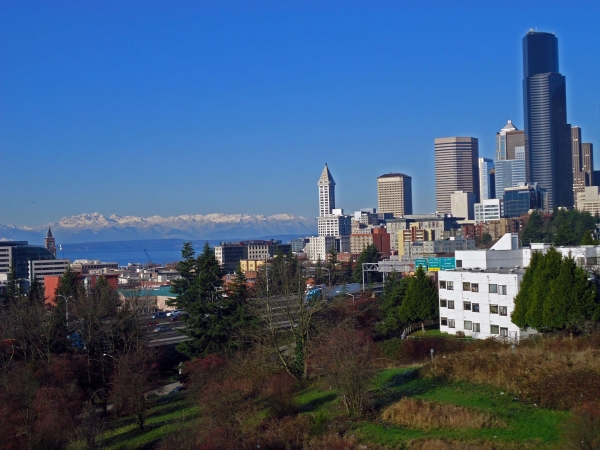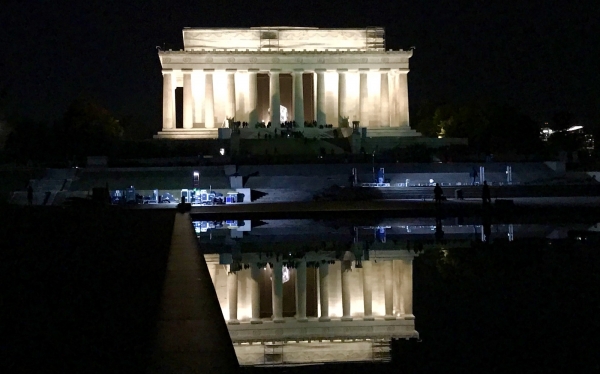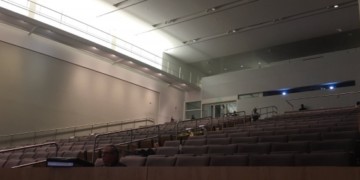Peter WarskiBlockedUnblockFollowFollowingDec 1
I have an acquaintance who works for Amazon in Seattle and owns a condo on Queen Anne that offers a sweeping view of the city skyline and Lake Union. She was recently lamenting on Facebook that (“first-world problems, I know, but…”) a developer had purchased a nearby parcel with plans to build housing that would, in her words, “obliterate” her view of the lake.
“I’m quite sick about this,” she wrote, adding that she’d explore options to fight it. (She’s unlikely to succeed.)
Needless to say, I have a lot of thoughts about her predicament. First, a quick tangent: I think it’s a really stupid idea to pay substantially more for a property just because it has a view. Here’s an idea: If your house has no view, go outside and find one. (That’s not hard to do in Seattle.) It’s a completely free alternative, and you’ll get exercise.
Also, views tend to change. Did this acquaintance of mine really think that her postcard vista of the city would forever stay the same, particularly in a place as dynamic and fast-growing as Seattle? Especially in an urban environment, if you invest in expensive real estate primarily or exclusively because of a view, you’re taking a calculated and arguably dumb risk.
All of this to say, while the situation sucks for her, I have a hard time sympathizing (if you couldn’t tell) — mainly because her response to it illustrates in fairly striking fashion why America’s most so-called “progressive” or “liberal” cities are increasingly out of reach for all but the most privileged and affluent.
Human greed is universal. It knows neither physical geography nor social, cultural, or ideological orientation. I am not saying my Facebook friend is greedy. (I simply don’t know her well enough to judge.) I am saying, however, that homeownership in general tends to make people act that way.
On at least some level, it’s understandable. Why would you endorse anything that could adversely affect your property’s value — like a new high-rise down the hill that blocks the view you used to have from your balcony? I’m not a homeowner, but if I were, I’d probably react similarly, because I’m a stingy bastard and I hate the thought of losing money (lest you think I write this from any sort of moral high horse).
But “understandable” is not synonymous with “defensible” in this case. One of the reasons why cities like Seattle are now largely unaffordable to the masses is because current homeowners in those places are no different from homeowners in the reddest parts of the reddest states: They want their properties to keep getting more valuable, not less, so they fight tooth and nail against any changes, however innocuous or well-intended, that are at odds with that goal — like zoning amendments that would facilitate higher-density development in order to increase the housing supply, or rent-controlled or subsidized housing units that might, in their opinion, bring in more riffraff or block their views. (Can you say “NIMBY”?)
This is a huge problem in Seattle. Last spring, Politico did a fascinating piece on this topic that mentioned a 76-year-old homeowner who bought his three-bedroom bungalow in 1969 in one of the city’s most desirable neighborhoods for $14,000. Today, his home is worth well over $1 million, and — surprise, surprise — he opposes efforts to increase density around there, ostensibly under the guise of neighborhood “character” and “livability.”
'My Generation Is Never Going to Have That'
On a brisk Saturday morning in March, a 27-year-old programmer named Zach Lubarsky, bundled in a fatigue jacket and…www.politico.com
Any way you slice it, this is greedy — particularly coming from a Baby Boomer whose generation, with all due respect to Baby Boomers, is no longer the primary driver of the economy in booming cities like Seattle, and particularly when you consider that his home is worth so much now precisely because of the young newcomers who struggle to find a place to live at the hands of his antiquated, oppositional viewpoints on urban planning.
It’s a similar problem here in Washington, D.C., another hideously overpriced coastal city that, like Seattle, loves to think of itself as “progressive” and “liberal” even as its real estate market is now essentially out of reach to all except the privileged few. (How the hell is that “progressive”?)

Unless you live under a rock, by now you’ve surely heard that Amazon has announced its plans to split its second headquarters into the already-economically-saturated cities of New York and Arlington, Virginia, where I currently live. (I have plenty of thoughts on this, too, but it’s worthy of a post of its own.) In the wake of that announcement, I immediately started seeing ads from real estate brokers advising prospective buyers to “act now.”
Why? Well, the answer is pretty obvious. People expect that once Amazon sets up shop in the D.C. area, things will go the way of Seattle around here (again, not that they weren’t already), and property owners will make bank. Of course, forget about everyone else of limited means — you know, dispensable contributors to the economy like police officers, public schoolteachers, and service workers — who struggle to keep a roof over their heads, period, even as the city in which they live is increasingly defined by its incredible, sometimes obscene wealth.
Here's the $12 million reno Jeff Bezos is planning for his $23 million D.C. mansion
A staircase made from a slab of marble. A limestone fireplace. A whiskey cellar.www.cnbc.com
For better or for worse, homeownership is one of the biggest drivers of inequality in America — both in liberal bastions and conservative holdouts. I’m not arguing that people shouldn’t be able to invest in property as a source of security or at least modest profit for themselves. I’m also not saying that the problem can be solved simply by increasing density, imposing rent control, increasing rent subsidies, or raising taxes (though any of those or a combination thereof might help). There is no silver-bullet solution to this crisis. The aforementioned Politico article seems to make that clear.
What I am saying leads me back to the story of my Facebook friend. You can tell from her profile that she considers herself a progressive. She follows the news closely, both locally and nationally. She detests Trump and advertises liberal causes and candidates. That’s why her lamentations about her view struck me as more than just a bit…tone-deaf.
Is she simply choosing to ignore the effects her employer has had on its home city? Does she not realize that there are people living in their cars because of the housing crisis in her hometown, for whom a view of sailboats on the water is the least of their concerns? Does she not at all see herself as a contributor (or at least complacent observer) to the problem? And does this all not conflict even a little bit with her seemingly liberal sensibilities?
Same thing goes more generally for cities like Seattle or Washington, D.C. (Or San Francisco or New York or Los Angeles or San Diego or…the list goes on.) These places, sadly, are little more than playgrounds for the rich anymore. But among those who aren’t on the frontlines of the problem, the line of thinking tends to go like this: We’re LGBTQ-friendly, and we recycle and compost, and pot is legal, and there are tons of sustainable, farm-to-table restaurants and craft breweries, so…we’re, like, totally progressive!
Not only is this mentality arrogant and elitist; it’s also an excuse for not doing anything. Don’t believe me? Read this 2014 rant authored by a prominent figure in the so-called “Resistance” movement who, incredibly, later ran for Congress in Texas of all places. (She lost the primary. Thankfully.)
Rant: Yeah, DC Is Pricey- Get Over It Already!
Oh, wow, your house cost five times what your childhood BFF paid for hers in exurban Dallas and it's half the size? www.washingtonian.com
The crux of her tirade is basically what I just said: We have great restaurants and free museums and [occasionally functional] public transportation and if that’s not good enough for you then get the hell out!
Again, I don’t need to point out that for a lot of people, “browsing the Bill of Rights” for free during their lunch break (no, seriously, she mentioned that) is not high on the list of what makes a place welcoming or livable…or, hell, survivable.
A blue city in a blue state is not “progressive” just because it votes overwhelmingly Democratic, or because it has lots of hipster joints, or because its hipsters smoke joints. If a city is not accessible to people of diverse socioeconomic statuses and means — and if its privileged residents resist efforts to change this because they’re worried about their own bottom lines — then, really, such a city is no different or better than one in the heart of red-state flyover country where, incidentally, middle-class young adults are moving back because they can still actually afford homes there.
Hot housing markets: 10 cities where Millennials are buying homes
When the time comes for the Millennial generation to buy a home, their top consideration is not amenities like nightlife but affordability.www.usatoday.com
America’s self-proclaimed “liberal” cities are increasingly the exclusive domain of the rich, and that’s not “liberal” or “progressive” at all.

























Connect with us